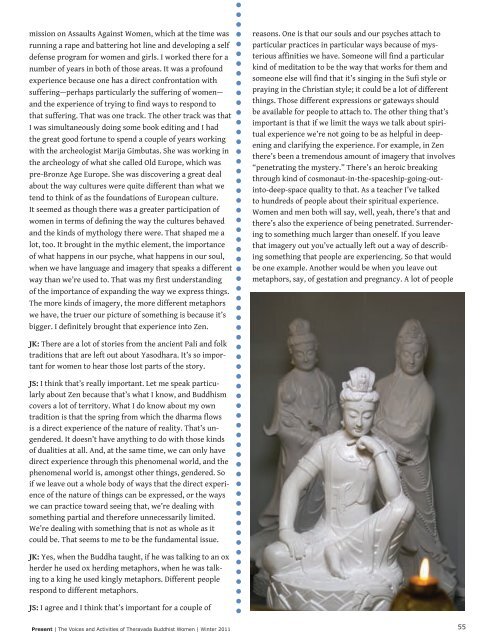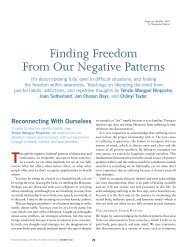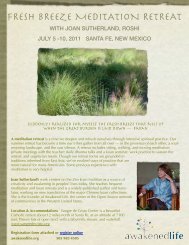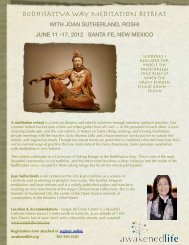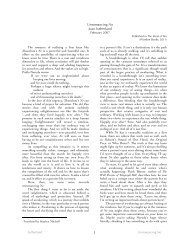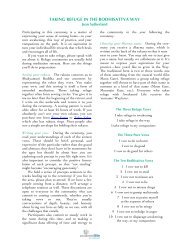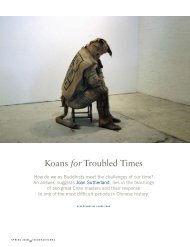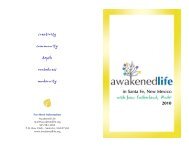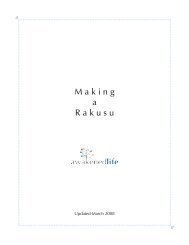An Interview with Joan Sutherland, Roshi - Awakened Life
An Interview with Joan Sutherland, Roshi - Awakened Life
An Interview with Joan Sutherland, Roshi - Awakened Life
Create successful ePaper yourself
Turn your PDF publications into a flip-book with our unique Google optimized e-Paper software.
mission on Assaults Against Women, which at the time was<br />
running a rape and battering hot line and developing a self<br />
defense program for women and girls. I worked there for a<br />
number of years in both of those areas. It was a profound<br />
experience because one has a direct confrontation <strong>with</strong><br />
suffering—perhaps particularly the suffering of women—<br />
and the experience of trying to find ways to respond to<br />
that suffering. That was one track. The other track was that<br />
I was simultaneously doing some book editing and I had<br />
the great good fortune to spend a couple of years working<br />
<strong>with</strong> the archeologist Marija Gimbutas. She was working in<br />
the archeology of what she called Old Europe, which was<br />
pre-Bronze Age Europe. She was discovering a great deal<br />
about the way cultures were quite different than what we<br />
tend to think of as the foundations of European culture.<br />
It seemed as though there was a greater participation of<br />
women in terms of defining the way the cultures behaved<br />
and the kinds of mythology there were. That shaped me a<br />
lot, too. It brought in the mythic element, the importance<br />
of what happens in our psyche, what happens in our soul,<br />
when we have language and imagery that speaks a different<br />
way than we’re used to. That was my first understanding<br />
of the importance of expanding the way we express things.<br />
The more kinds of imagery, the more different metaphors<br />
we have, the truer our picture of something is because it’s<br />
bigger. I definitely brought that experience into Zen.<br />
reasons. One is that our souls and our psyches attach to<br />
particular practices in particular ways because of mysterious<br />
affinities we have. Someone will find a particular<br />
kind of meditation to be the way that works for them and<br />
someone else will find that it’s singing in the Sufi style or<br />
praying in the Christian style; it could be a lot of different<br />
things. Those different expressions or gateways should<br />
be available for people to attach to. The other thing that’s<br />
important is that if we limit the ways we talk about spiritual<br />
experience we’re not going to be as helpful in deepening<br />
and clarifying the experience. For example, in Zen<br />
there’s been a tremendous amount of imagery that involves<br />
“penetrating the mystery.” There’s an heroic breaking<br />
through kind of cosmonaut-in-the-spaceship-going-outinto-deep-space<br />
quality to that. As a teacher I’ve talked<br />
to hundreds of people about their spiritual experience.<br />
Women and men both will say, well, yeah, there’s that and<br />
there’s also the experience of being penetrated. Surrendering<br />
to something much larger than oneself. If you leave<br />
that imagery out you’ve actually left out a way of describing<br />
something that people are experiencing. So that would<br />
be one example. <strong>An</strong>other would be when you leave out<br />
metaphors, say, of gestation and pregnancy. A lot of people<br />
JK: There are a lot of stories from the ancient Pali and folk<br />
traditions that are left out about Yasodhara. It’s so important<br />
for women to hear those lost parts of the story.<br />
JS: I think that’s really important. Let me speak particularly<br />
about Zen because that’s what I know, and Buddhism<br />
covers a lot of territory. What I do know about my own<br />
tradition is that the spring from which the dharma flows<br />
is a direct experience of the nature of reality. That’s ungendered.<br />
It doesn’t have anything to do <strong>with</strong> those kinds<br />
of dualities at all. <strong>An</strong>d, at the same time, we can only have<br />
direct experience through this phenomenal world, and the<br />
phenomenal world is, amongst other things, gendered. So<br />
if we leave out a whole body of ways that the direct experience<br />
of the nature of things can be expressed, or the ways<br />
we can practice toward seeing that, we’re dealing <strong>with</strong><br />
something partial and therefore unnecessarily limited.<br />
We’re dealing <strong>with</strong> something that is not as whole as it<br />
could be. That seems to me to be the fundamental issue.<br />
JK: Yes, when the Buddha taught, if he was talking to an ox<br />
herder he used ox herding metaphors, when he was talking<br />
to a king he used kingly metaphors. Different people<br />
respond to different metaphors.<br />
JS: I agree and I think that’s important for a couple of<br />
Present | The Voices and Activities of Theravada Buddhist Women | Winter 2011 55


